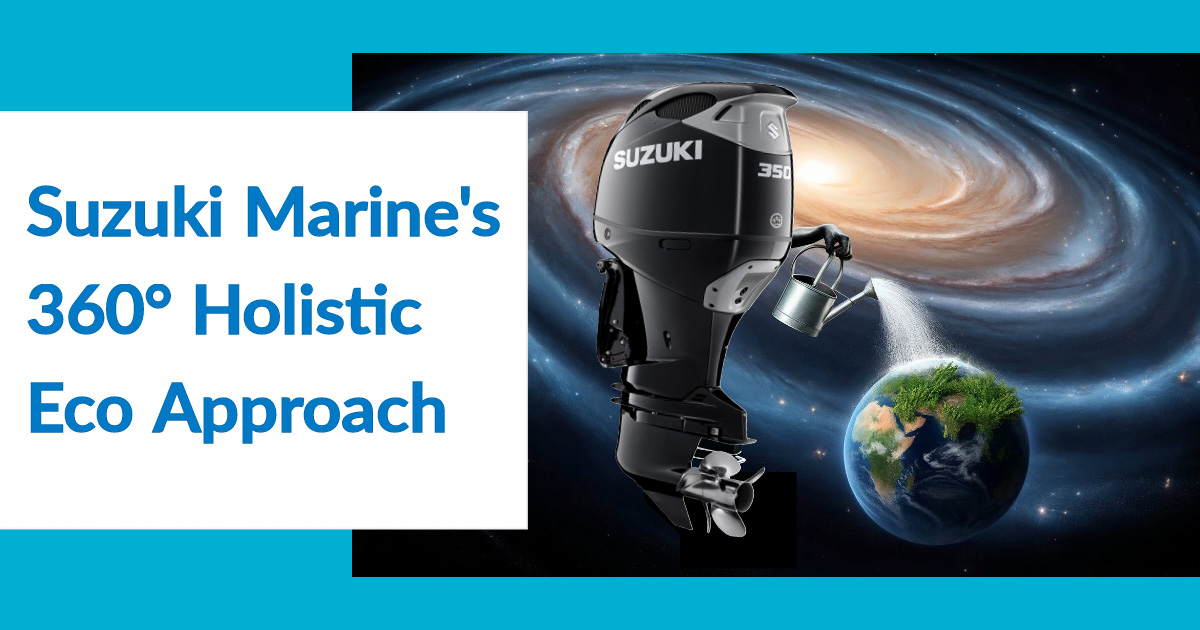
Suzuki Outboards: Propelling Forward with Eco-Friendly Innovation
Suzuki Outboards: Propelling Forward with Eco-Friendly Innovation
In the quest for a more sustainable future, Suzuki Outboards emerges as a force with a unique, holistic approach to environmental conservation. Their commitment embodies a comprehensive vision for ecological sustainability. Suzuki shows a deep understanding that true environmental stewardship requires action on multiple fronts—from reducing emissions and combating microplastic pollution to pioneering eco-friendly packaging and beyond. As we delve into the breadth of Suzuki’s innovative efforts, it becomes clear that their strategy is not merely about making boating cleaner and more efficient; it’s about redefining our relationship with the marine environment. Join us as we explore how Suzuki Marine is setting the course towards a greener, more sustainable planet.
Deep Dive into Suzuki’s Environmental Technologies
Lean Burn Control Technology
By dynamically adjusting the air-to-fuel ratio to match the engine’s load conditions, this technology improves fuel efficiency by 10-20%, significantly reducing CO2 emissions. This represents a key step towards cleaner marine propulsion, highlighting Suzuki’s dedication to environmental sustainability.
Microplastics Collection System
Incorporated into the DF115B and DF140B models, this innovative system filters harmful microplastic particles from the water. It’s a pioneering approach to mitigating ocean pollution, enabling boaters to play a part in cleaning the seas with every journey.
Eco-Friendly Packaging Initiative
Suzuki’s shift to paper-based packaging for its outboard motor parts demonstrates a significant reduction in plastic use, preventing about 2 tons of plastic waste annually. This move underscores Suzuki’s broader commitment to reducing environmental impact beyond its product innovations.
The Clean Ocean Project
Spearheading marine conservation efforts, the Clean Ocean Project has facilitated the removal of over 10,000 kilograms of marine debris globally, through cleanup events involving the Suzuki community. This initiative reflects Suzuki’s hands-on approach to preserving ocean health and fostering environmental awareness.
Battery-Less Fuel Injection
This groundbreaking technology enables smaller engines to start without a battery, leveraging a mechanical system that’s both innovative and eco-friendly. By reducing dependency on traditional batteries, which often contain harmful metals and chemicals, Suzuki is leading the way in resource conservation and reducing hazardous waste. This also contributes to enhanced fuel economy, showcasing Suzuki’s commitment to efficiency and sustainability.
Water Detecting System
Suzuki’s water detecting system serves a crucial role in engine preservation and environmental protection. By alerting the operator to water-contaminated fuel, it prevents engine damage and inefficiencies that could lead to increased emissions and repair waste. This technology ensures Suzuki engines operate cleanly and efficiently, prolonging their lifespan and minimizing their environmental impact.
High Energy Rotation Lower Unit
The design of Suzuki’s lower unit is a marvel of engineering, aimed at reducing water resistance during operation. This results in better efficiency and higher speeds with a smaller ecological footprint. By optimizing the hydrodynamic performance of their outboards, Suzuki not only enhances the boating experience but does so with a keen eye on reducing energy consumption and minimizing environmental impact.
Why We’re Proud to Partner with Suzuki at The Boat Place
Our partnership with Suzuki is rooted in a shared commitment to innovation and environmental responsibility. Suzuki’s technological advancements go beyond performance, offering tangible benefits to the marine ecosystem and leading the industry towards a greener future. We share these values and are proud to be part of a movement of such great impact.
Join us in our journey towards a cleaner, more sustainable marine environment. Together, we can contribute to the preservation and enjoyment of our oceans for generations to come.
